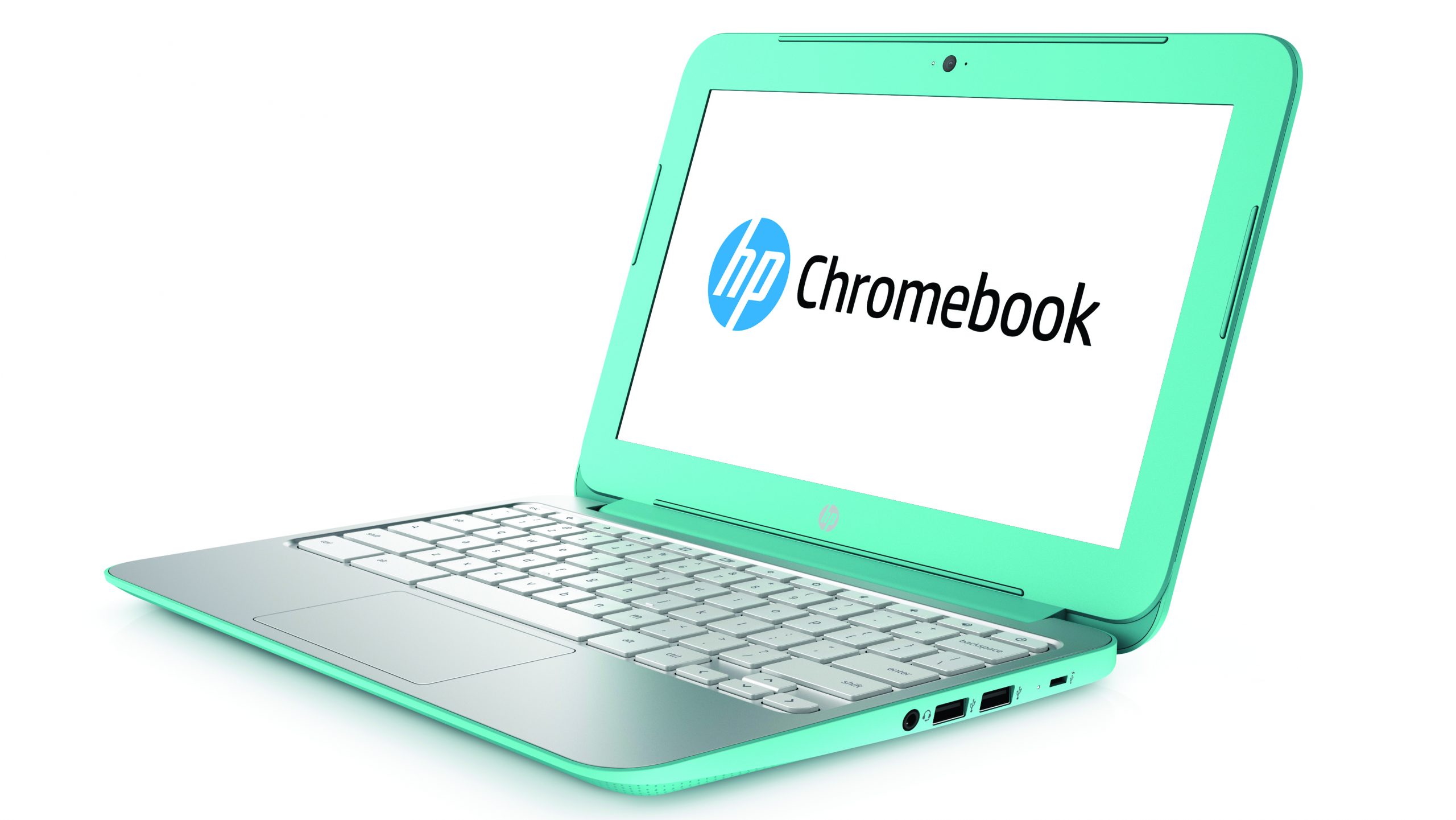I know what you are thinking already, “Isn’t Google an evil empire in cahoots with the CIA and NSA to spy on us?”
Yes. Welcome to the 21st Century Panopticon. We’re going to need some sort of tech revolution to even start unwinding that. But if you don’t want to, don’t get a Chromebook. Google has enough metadata on you already, no need to add more if you’re not so inclined.
Their Chromebooks are lightweight Linux devices. The OS is a wrapper for their Chrome Browser, basically, and is easy and nice to use. Think of them as dedicated browser devices.
Because of that, the hardware is light. A decent screen and keyboard, low powered CPU that doesn’t require a lot of battery, long battery life, and all flash storage. This means local storage is near nil. You won’t be replacing your laptop, much less your desktop, with one.
 It sounds under powered. It is. That’s not the point. The point is get you to drink the Google Office Kool-Aid and that’s where these devices make sense in some regards. Google’s answer to MS Office is great for general usage. They keep pouring effort into and it’s starting to show well. Since a lot of computer use is browsing and standard office work, this is a great niche for these devices. Chrome OS keeps a local copy of your files on the SSD card for the times you don’t have internet access. The syncing seems to be solid for normal use cases. I have worked on a doc on my laptop, walked off, pulled it up on my phone, made changes, then went to the Chromebook and everything was up-to-date. For cloud syncing and storage, Google has sunk a lot of resources into the process and it holds up under usage.
It sounds under powered. It is. That’s not the point. The point is get you to drink the Google Office Kool-Aid and that’s where these devices make sense in some regards. Google’s answer to MS Office is great for general usage. They keep pouring effort into and it’s starting to show well. Since a lot of computer use is browsing and standard office work, this is a great niche for these devices. Chrome OS keeps a local copy of your files on the SSD card for the times you don’t have internet access. The syncing seems to be solid for normal use cases. I have worked on a doc on my laptop, walked off, pulled it up on my phone, made changes, then went to the Chromebook and everything was up-to-date. For cloud syncing and storage, Google has sunk a lot of resources into the process and it holds up under usage.
More and more solutions have been coming to the Chrome App Store. Odds are you can find something close to what you’re looking for. I haven’t found one that matches native app usability, though. For what these devices are, it’s fine.
The best uses for the Chromebook as its designed is for family members that need a laptop but you don’t want to deal with Windows or spend the money for Apple to get what would be functionally equivalent.
And they are cheap. Under $200 gets you decent Chromebook. Sure, you can spend up to $500 on one, but that’s up to you. The newer ones are also touch screen, if that’s important to you, and some of those are the kind that the keyboard flips behind and they become a tablet.
But it gets better. And by ‘better’ I mean ‘nerdier’.
Remember how I said it was a Linux device? You can install Linux on them.
There are three main ways of doing this, each with their own pros and cons. The biggest challenge is figuring out what a particular brand and model support. The ARM chipsets have the fewest options while the Intel Core series have the most.
You have to put the Chromebook into developer mode which will probably void warranties and offend some sort of legal and/or regulatory body. Your call on this.
There are three basic ways for leveling up your Chromebook:
- Crouton
- External boot off a USB drive
- Dual boot or replace ChromeOS
Crouton is the easiest and with the most support.
External boot is more touchy but not much more. You’ll need a USB thumb drive, a distro that runs on your Chromebook hardware, and software to prepare the USB drive.
Dual boot is when you allocate storage space to a different OS and pick which one to run on boot.
Replace is similar, but instead of sharing, you replace ChromeOS with a different Linux distro.
I took an old ARM Samsung Chromebook and started researching and trying out different options.
Crouton worked. I installed XFCE and found it sort of usable. I deleted the install and went with a straight up command line target based on Ubuntu Xenial with no problems. Starting it up was snappy since crouton doesn’t do virtualization, it uses the ChromeOS instead. I installed Python 2.7. Once I confirmed that was working, I installed scipy, pandas, numpy, and a stats package, all for Python. It took quite some time, that little ARM processor isn’t a powerhouse. I ran some quick smoke tests. I need to do some benchmarking but my initial pass indicates the performance is acceptable.
Feeling bold, I got the statistical language R installed with a little work by adding the official CRAN repo to the apt sources. Again, it takes a bit of time to install. After the little Chromebook finished, I had a functioning R environment.
I installed vim and emacs with no hiccups and both work on the Chromebook.
Okay, so the Chromebook, even the older ARM versions, can be repurposed to run Linux. So what?
Even hosted inside the ChromeOS, this gives you options and control beyond what Google had planned for the devices. You can do more than just consume websites with the device, you have an inexpensive, lightweight, light powered, long battery life device that is robust and moldable to your needs. Not as much as a full-sized laptop, to be sure, but for the price new, it’s hard to beat.
As is, they are competent machines, if you aren’t overly concerned about privacy. With a little bit of work, they are much more than just a web browser. And if you have the right hardware and time, you can replace the OS with Linux, dumping Google’s spying on you laptop and just have them spy on your online activities.










I might check some of these out. I was hoping the Pinebook would be out by now. It’s a Pine A64 (Raspberry Pi clone) wrapped in a laptop chassis. Perhaps a Chromebook would be better.
There are other projects out there but none have materialized quite like the Chromebooks. Love them or hate them, Google has brought a functioning, cheap, Linux laptop to market.
5
4.5
I actually like them for an Ubuntu distro device.
Although, truth be told, you can actually buy a 10 year old laptop with a battery upgrade (about 75 dollars), feed it ubuntu with a CD load, and probably have a more versatile and powerful machine than a chromebook.
I have built and given those away to elderly relatives at least a dozen times.
“I have built and given those away to elderly relatives at least a dozen times.”
How do you avoid all the support calls?
Have you used an ubuntu device?
at least old Ubuntu? I don’t know about the newer version.
“buy a 10 year old laptop…have a more versatile and powerful machine than a chromebook”
HAHAHAHAHA.
No.
It’s interesting how you pulled the media ellipsis to remove the word ‘probably’. Why would you do that?
And I don’t know about your elderly friends, but mine seem perfectly happy with a machine that simply web browses, emails, plays media, views pictures, and edits texts without too much fuss.
“Why would you do that?”
Because you used it as a weaselly way to get out of making a statement since you offered zero specifications.
“but mine seem perfectly happy”
Not your original statement. Stop moving the goalposts.
The Samsung ARM Chromebook 2012 specs:
11.6-inch Display, 1366 x 768 resolution
Samsung 1.7 GHz Exynos 5000 Series Dual Processor
1333.00 2 GB DDR3L RAM
16 GB Solid State Drive, 2 USB Ports: 1 USB 3.0 + 1 USB 2.0
HDMI Port, Built-in dual band Wi-Fi 802.11 a/b/g/n, web camera included
Battery life around 6 hours
2.43 lbs
Those soundly beat any laptop in the $500 range that’s 10 years old.
Let’s take a look at the Dell Inspiron.
Released online on July 27, 2007, the Inspiron 1525 is Dell’s 15.4″ budget laptop that weighs 5.8 lbs.
The El Cheapo model specs, which would be between $250 – $350 IIRC:
Intel Celeron 900
Memory: 2 GB shared dual channel DDR2 SDRAM @ 800 MHz.
LCD Display: 15.4″ CCFL-backlit widescreen with 1280 × 800 resolution
Hard Drive:80 GB SATA at 5400 RPM
Wi-Fi Card: Dell Wireless 1397 802.11b/g half mini-card
I/O ports: 4 USB 2.0 ports, 1 Fast Ethernet port, 1 modem port, 1 VGA output, 1 S-video TV-out connector, 1 HDMI connector, 2 headphone jack, 1 microphone jack, 1 Express Card slot, 2 Mini-Card slots , 1 8-in-1 memory card reader, 1 Consumer IR (receive only), and 1 power adapter connector.
Battery life around 4 hours
The 5 year-old Chromebook is half the weight with a far faster memory and storage, a better screen, faster processor and longer battery life.
The Chromebooks are great little devices which are unfortunately backed by Google.
I’m writing this now on my Chromebook. I bought one last summer when they were on sale at a nearby Meijer’s, much to the consternation of my wife, until she started using it. Needless to say, she took it over, and I had to wait until the next sale to get one for myself.
Biggest complain I have is the relatively small size of the keyboard, and the touchpad tends to be extra sensitive. When you’re writing long documents, it has a tendency to “jump” places in the text.
Awesome. Which make and model did you get?
The one I’ve been messing with is slow with big documents and hasn’t exhibited the same “jump” problem.
Have you tried to tweak the touchpad settings?